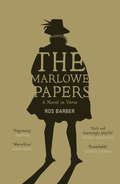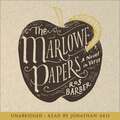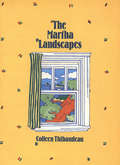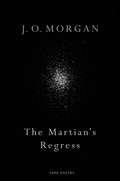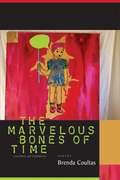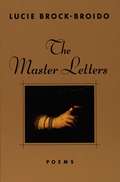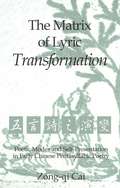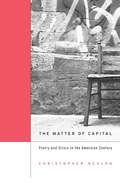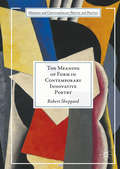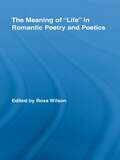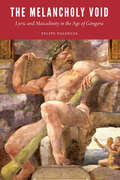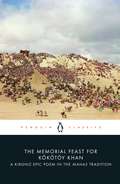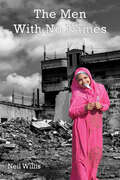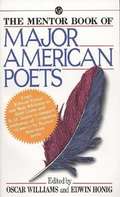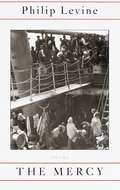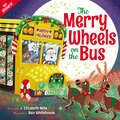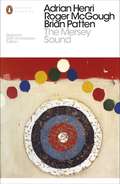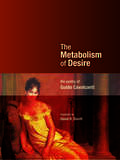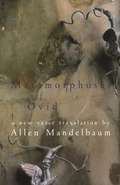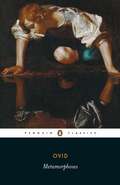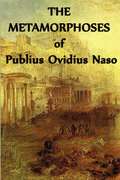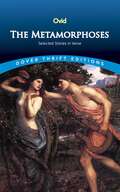- Table View
- List View
The Marlowe Papers
by Ros Barber*WINNER OF THE DESMOND ELLIOTT PRIZE 2013*On May 30th, 1593, a celebrated young playwright was killed in a tavern brawl in London. That, at least, was the official version. Now Christopher Marlowe reveals the truth: that his 'death' was an elaborate ruse to avoid being convicted of heresy; that he was spirited across the Channel to live on in lonely exile; that he continued to write plays and poetry, hiding behind the name of a colourless man from Stratford - one William Shakespeare. With the grip of a thriller and the emotional force of a sonnet, this remarkable novel in verse gives voice to a man who was brilliant, passionate and mercurial. A cobbler's son who counted nobles among his friends, a spy in the Queen's service, a fickle lover and a declared religious sceptic, he was always courting trouble. Memoir, love letter, confession, settling of accounts and a cry for recognition as the creator of some of the most sublime works in the English language, The Marlowe Papers brings Christopher Marlowe and his era to vivid life. Written by a poet and scholar, it is a work of exceptional art, erudition and imagination.
The Marlowe Papers
by Ros BarberOn May 30th, 1593, a celebrated young playwright was killed in a tavern brawl in London. That, at least, was the official version. Now let Christopher Marlowe tell you the truth: that his 'death' was an elaborate ruse to avoid his being hanged for heresy; that he was spirited across the channel to live on in lonely exile, longing for his true love and pining for the damp streets of London; that he continued to write plays and poetry, hiding behind the name of a colourless printer from Stratford - one William Shakespeare. With the grip of a thriller and the emotional force of a sonnet, this extraordinary novel in verse gives voice to a man who was brilliant, passionate, mercurial and not altogether trustworthy. The son of a cobbler who rose so far in Elizabethan society that he counted nobles among his friends and patrons, a spy in the Queen's service, a fickle lover and a declared religious sceptic, he was always courting trouble. When it caught up with him, he was lucky to have connections powerful enough to help him escape. Memoir, love letter, settling of accounts and a cry for recognition as the creator of some of the most sublime works in the English language, this is Christopher Marlowe's testament - and a tour de force by an award-winning poet: provocative, persuasive and enthralling. (P)2012 Hodder & Stoughton
The Marlowe Papers: A Novel
by Ros Barber*WINNER OF THE DESMOND ELLIOTT PRIZE 2013*On May 30th, 1593, a celebrated young playwright was killed in a tavern brawl in London. That, at least, was the official version. Now Christopher Marlowe reveals the truth: that his 'death' was an elaborate ruse to avoid being convicted of heresy; that he was spirited across the Channel to live on in lonely exile; that he continued to write plays and poetry, hiding behind the name of a colourless man from Stratford - one William Shakespeare. With the grip of a thriller and the emotional force of a sonnet, this remarkable novel in verse gives voice to a man who was brilliant, passionate and mercurial. A cobbler's son who counted nobles among his friends, a spy in the Queen's service, a fickle lover and a declared religious sceptic, he was always courting trouble. Memoir, love letter, confession, settling of accounts and a cry for recognition as the creator of some of the most sublime works in the English language, The Marlowe Papers brings Christopher Marlowe and his era to vivid life. Written by a poet and scholar, it is a work of exceptional art, erudition and imagination.
The Martha Landscapes
by Colleen ThibaudeauReaders of Colleen Thibaudeau's selected poems, My Granddaughters Are Combing Out Their Long Hair, will feel at home in The Martha Landscapes, where domestic dearness and the exotic, like strangers, "make their first acquaintance….. in a blur of words." The cross-relationships that occur, in a poetry of technical virtuosity that feels as easy as breathing, are sensed to be permanent.
The Martian's Regress
by J. O. Morgan**SHORTLISTED FOR THE TS ELIOT PRIZE 2020**From the winner of the Costa Poetry AwardA lone martian returns to Earth. He leaves behind him a hardened survivalist culture, its muddled myths and songs, its continued abuse of the environment that sustains it. During this journey back to the now-broken and long-abandoned mother planet, the martian begins to consider his own uncertain origins, and his own future.Cut off from his people, the martian's story is that of the individual: his duty at odds with his desire; the race of which he's still a part playing always on his mind, as well as the race that once was. This is the story of what life becomes when stripped of all that makes it worth living - of what humans become when they lose their humanity.The Martian's Regress is a brilliant, provocative, often darkly comic work that explores what a fragile environment eventually makes of those who persist in tampering with it.
The Marvelous Bones of Time: Excavations and Explanations
by Brenda CoultasIncorporating memoir, folktales, fact, and hearsay into two distinctly moving poems, this collection attests to history's manifestation in the present moment.
The Master Letters
by Lucie Brock-BroidoThe title of this richly textured book derives from two of the three mysterious letters left by Emily Dickinson--the ones addressed to "Dear Master. " Lucie Brock-Boido has imagined a series of letters echoing devices found in Dickinson's own work. "We feel we are in the presence of something entirely new, " says Bonnie Costello inThe Boston Review. "Not even Brock-Broido's wonderful first book,A Hunger, prepares us for this bold encounter. "
The Master of Insomnia
by Boris A. NovakA collision between contemporary poetics and the Renaissance lyric, between aestheticism and political engagement, The Master of Insomnia is a collection of Slovenian poet Boris A. Novak's verse from the last fifteen years, including numerous poems never before available in English. In these sensitive translations, Novak stands revealed as both innovator and observer; as critic Aleš Debeljak has written: "The poet's power in bearing witness to Sarajevo and Dalmatia, to his childhood room and his retired father, to the indifferent passage of time and the desperate pain of loss, confirms the melancholy clairvoyance of Walter Benjamin, who stated that what is essential hides in the marginal, negligent, and hardly observed details. Whoever strives to see the 'big picture' will inevitably overlook the essential . . . [Novak's] wide-open eyes must watch over both the beauty of this life and the horror of its destruction."
The Master of Insomnia
by Boris A. NovakA collision between contemporary poetics and the Renaissance lyric, between aestheticism and political engagement, The Master of Insomnia is a collection of Slovenian poet Boris A. Novak's verse from the last fifteen years, including numerous poems never before available in English. In these sensitive translations, Novak stands revealed as both innovator and observer; as critic Aleš Debeljak has written: "The poet's power in bearing witness to Sarajevo and Dalmatia, to his childhood room and his retired father, to the indifferent passage of time and the desperate pain of loss, confirms the melancholy clairvoyance of Walter Benjamin, who stated that what is essential hides in the marginal, negligent, and hardly observed details. Whoever strives to see the 'big picture' will inevitably overlook the essential . . . [Novak's] wide-open eyes must watch over both the beauty of this life and the horror of its destruction."
The Matrix of Lyric Transformation: Poetic Modes and Self-Presentation in Early Chinese Pentasyllabic Poetry (Michigan Monographs In Chinese Studies #75)
by Zong-qi Cai Zong-qu CaiPentasyllabic poetry has been a focus of critical study since the appearance of the earliest works of Chinese literary criticism in the Six Dynasties period. Throughout the subsequent dynasties, traditional Chinese critics continued to examine pentasyllabic poetry as a leading poetic type and to compile various comprehensive anthologies of it. The Matrix of Lyric Transformation enriches this tradition, using modern analytical methods to explore issues of self-expression and to trace the early formal, thematic, and generic developments of this poetic form. Beginning with a discussion of the Yüeh-fu and ku-shih genres of the Han period, Cai Zong-qi introdues the analytical framework of modes from Western literary criticism to show how the pentasyllabic poetry changed over time. He argues that changing practices of poetic composition effected a shift from a dramatic mode typical of folk compositions to a narrative mode and finally to lyric and symbolic modes developed in literati circles.
The Matter of Capital: Poetry and Crisis in the American Century
by Christopher S. NealonChristopher Nealon's reexamination of North America's poetry in English, from Ezra Pound and W. H. Auden to younger poets of the present day, argues persuasively that the central literary project of the past century was to explore the relationship between poetry and capitalism--its impact on individuals, communities, and cultures.
The Meaning of Form in Contemporary Innovative Poetry
by Robert SheppardThis study engages the life of form in contemporary innovative poetries through both an introduction to the latest theories and close readings of leading North American and British innovative poets. The critical approach derives from Robert Sheppard's axiomatic contention that poetry is the investigation of complex contemporary realities through the means (meanings) of form. Analyzing the poetry of Rosmarie Waldrop, Caroline Bergval, Sean Bonney, Barry MacSweeney, Veronica Forrest-Thomson, Kenneth Goldsmith, Allen Fisher, and Geraldine Monk, Sheppard argues that their forms are a matter of authorial design and readerly engagement.
The Meaning of Life in Romantic Poetry and Poetics (Routledge Studies in Romanticism)
by Ross WilsonThis volume brings together an impressive range of established and emerging scholars to investigate the meaning of ‘life’ in Romantic poetry and poetics. This investigation involves sustained attention to a set of challenging questions at the heart of British Romantic poetic practice and theory. Is poetry alive for the Romantic poets? If so, how? Does ‘life’ always mean ‘life’? In a range of essays from a variety of complementary perspectives, a number of major Romantic poets are examined in detail. The fate of Romantic conceptions of ‘life’ in later poetry also receives attention. Through, for examples, a revision of Blake’s relationship to so-called rationalism, a renewed examination of Wordsworth’s fascination with country graveyards, an exploration of Shelley’s concept of survival, and a discussion of the notions of ‘life’ in Byron, Kierkegaard, and Mozart, this volume opens up new and exciting terrain in Romantic poetry’s relation to literary theory, the history of philosophy, ethics, and aesthetics.
The Melancholy Void: Lyric and Masculinity in the Age of Góngora (New Hispanisms)
by Felipe ValenciaAt the turn of the seventeenth century, Spanish lyric underwent a notable development. Several Spanish poets reinvented lyric as a melancholy and masculinist discourse that sang of and perpetrated symbolic violence against the female beloved. This shift emerged in response to the rising prestige and commercial success of the epic and was enabled by the rich discourse on the link between melancholy and creativity in men. In The Melancholy Void Felipe Valencia examines this reconstruction of the lyric in key texts of Spanish poetry from 1580 to 1620. Through a study of canonical and influential texts, such as the major poems by Luis de Góngora and the epic of Alonso de Ercilla, but also lesser-known texts, such as the lyrics by Miguel de Cervantes, The Melancholy Void addresses four understudied problems in the scholarship of early modern Spanish poetry: the use of gender violence in love poetry as a way to construct the masculinity of the poetic speaker; the exploration in Spanish poetry of the link between melancholy and male creativity; the impact of epic on Spanish lyric; and the Spanish contribution to the fledgling theory of the lyric.The Melancholy Void brings poetry and lyric theory to the conversation in full force and develops a distinct argument about the integral role of gender violence in a prominent strand of early modern Spanish lyric that ran from Garcilaso to Góngora and beyond.
The Memorial Feast for Kökötöy Khan: A Kirghiz Epic Poem in the Manas Tradition
by Saghïmbay Orozbaq uuluThis great Central Asian epic, passed down through generations and now brought to life in a new translation, carries the reader into a world of nomads, warriors and horselords'I am a steel-fanged lion, a dragon ready to pounce, a mighty poplar with golden branches rising up to the sky'The bard Saghïmbay Orozbaq uulu composed his oral telling of the great Central Asian Manas epic in the early twentieth century, although it draws on far older sources. This vivid episode from his narrative tells the bravura story of an uncertain new khan, Boqmurun, who holds a great feast to commemorate his predecessor, Kökötöy. From east and west, warriors and their turbulent retinues come to compete in horse races, jousting and wrestling, and soon insults are hurled and scores settled violently. Yet none can beat the supreme hero, the mighty, truculent Manas. By turns earthy, stirring, bombastic and funny, Saghïmbay's work stands as a monument to the oral culture of a nomadic people.Daniel Prior's landmark translation includes a 'How to Read the Epic' section, commentary, maps and illustrations.Composed in oral performance by Saghïmbay Orozbaq uulu Translated by Daniel Prior
The Men With No Names
by Neil WillisPeople of the world all look to find their own position; firstly through family and friends, then the neighbourhood and finally work. Others prefer the commune of religion. All these influence the way they live and think, which in turn, allows them to find a cause close to our heart. But give people a democracy and you allow them to bloom, not just in their cause, but rendering them more freedom of thought. What could be better? The Men With No Names follows democracy in an insular town in Britain. This allows each person to have their opinion or put forward their own cause towards their fellow neighbours, as well as suggesting or rejecting ideas by the town mayor and council. Looking at the town’s folk from afar is one man who has seen the world and has his quiet opinions, also influenced by his own experiences of war, but far beyond what he had expected. The book looks at past history that repeats through each generation, the struggles of the people to find who they are, and finally, to who are the heroes in our world, and those who think they are heroic in their cause. There is always more to learn, but the main concern is that most people only use the narrow mind that they know.
The Mentor Book of Major American Poets
by Oscar Williams Edwin HonigA compact anthology of 3 centuries of poetry by 20 great American poets.
The Mercy: Poems
by Philip LevinePhilip Levine's new collection of poems (his first since The Simple Truth was awarded the Pulitzer Prize) is a book of journeys: the necessary ones that each of us takes from innocence to experience, from youth to age, from confusion to clarity, from sanity to madness and back again, from life to death, and occasionally from defeat to triumph. The book's mood is best captured in the closing lines of the title poem, which takes its name from the ship that brought the poet's mother to America: A nine-year-old girl travels all night by train with one suitcase and an orange. She learns that mercy is something you can eat again and again while the juice spills over your chin, you can wipe it away with the back of your hands and you can never get enough.From the Trade Paperback edition.
The Merry Wheels on the Bus (A Holiday Wheels on the Bus Book)
by J. Elizabeth MillsIt's Christmas Eve! Celebrate and sing along with this bestselling, jolly follow-up to The Spooky Wheels on the Bus -- plus, a sheet of festive stickers!One merry bus goes HO-HO-HO,HO-HO-HO, HO-HO-HO.One merry bus goes HO-HO-HO,All through the snow.Count from One Merry Bus up to Ten Busy Elves as this Christmas ride races through town picking up a few festive passengers along the way! Eye-catching art and a bouncy, countdown rhyme based on the familiar The Wheels on the Bus, is sure to make this a read-aloud favorite!
The Mersey Sound: Restored 50th Anniversary Edition (Penguin Modern Classics)
by Adrian Henri Roger McGough Brian Patten'The Mersey Sound is an attempt to introduce contemporary poetry to the general reader by publishing representative work by each of three modern poets in a single volume, in each case the selection has been made to illustrate the poet's characteristics in style and form'. With this modest brief, The Mersey Sound was conceived and first published in 1967. An anthology which features Roger McGough's work, alongside that of Brian Patten and Adrian Henri (The Liverpool Poets), it went on to sell over half a million copies and to become the bestselling poetry anthology of all time.
The Metabolism of Desire: The Poetry of Guido Cavalcanti
by Guido Cavalcanti David R SlavittThe fact that Cavlacanti’s friend, Dante Alighieri, was a supremely fine poet ought not blind us to Cavalcanti’s own, rather different excellence. Both men were attracted to the dolce stil nuovo, the “sweet new style” that emerged in thirteenth-century Florence. While Dante’s poetry was devoted to his childhood sweetheart, Beatrice, Cavalcanti’s poetry had more the tang of real-world experience: he struggled against unruly passions and sought instead to overcome love – a source of torment and despair. It is chiefly through the translations of Rossetti and Pound that English-speaking readers have encountered Cavalcanti’s work. Pound’s famous translation, now viewed by some as antiquated, is remarkably different from the translation provided here in the graceful voice of poet David Slavitt. Working under the significant restraints of Cavalcanti’s elaborate formal structures, Slavitt renders an English translation faithful to the original poetry in both rhyme and rhythm.
The Metamorphoses of Ovid
by Allen MandelbaumThrough Mandelbaum’s poetic artistry, this gloriously entertaining achievement of literature-classical myths filtered through the worldly and far from reverent sensibility of the Roman poet Ovid-is revealed anew. “[An] extraordinary translation...brilliant” (Booklist). With an Introduction by the Translator.
The Metamorphoses of Ovid
by Mary M. InnesOvid has gathered together a rich assortment of tales, which have one element in common: they all deal with transformations. He tells us of chaos changed into ordered harmony, of animals turned to stone, of men and women who become trees or animals, stones or stars.
The Metamorphoses of Publius Ovidius Naso
by OvidMetamorphose is a Latin narrative poem in fifteen books by the Roman poet Ovid, describing the history of the world from its creation to the deification of Julius Caesar within a loose mythico-historical framework. Completed in AD 8, it is recognized as a masterpiece of Golden Age Latin literature.
The Metamorphoses: Selected Stories in Verse (Dover Thrift Editions)
by OvidOne of ancient Rome's most celebrated poets, Ovid (43 B.C.–A.D. 18) wrote during the reign of Augustus. His works reflect a sentiment of art for pleasure's sake, without the ethical or moral overtones, which perhaps accounts for his enduring popularity. For more than two thousand years, readers have delighted in Ovid's playful eloquence; his influence on other writers has ranged from Dante and Chaucer to Shakespeare and Milton, and scenes from his stories have inspired many great works by Western artists.This selection of thirty stories from the verse translation by F. A. Wright of Ovid's famous work, The Metamorphoses, does full justice to the poet's elegance and wit. All of the tales involve a form of metamorphosis, or transformation, and are peopled by mythological gods, demigods, and mortals: Venus and Adonis, Pygmalion, Apollo and Daphne, Narcissus, Perseus, and Andromeda, Orpheus and Eurydice, the Cyclops, and Circe, among others.Although most of the stories did not originate with Ovid, it is quite possible that had he not written them down, these oral traditions would have been lost forever — and with them, a vast and valuable amount of Greco-Roman culture. This collection of the poet's best and most beloved narrative verses reflects the vitality of classical mythology. A selection of the Common Core State Standards Initiative.
